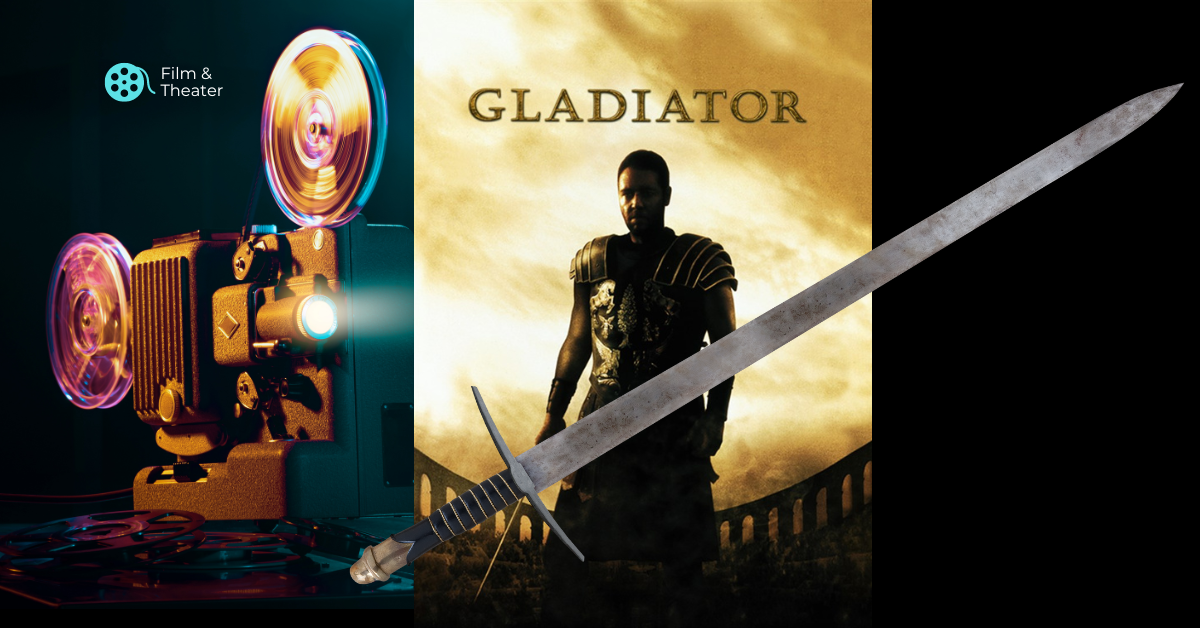The movie Gladiator
"Gladiator," directed by Ridley Scott, transports viewers to the brutal and majestic world of ancient Rome. The film follows Maximus Decimus Meridius, a general turned slave who seeks vengeance against the corrupt Emperor Commodus. Spanning themes of loyalty, honor, and sacrifice, "Gladiator" immerses us in a riveting tale of power struggles and redemption.
With its stunning visuals and meticulous attention to detail, the movie brings ancient Rome to life in all its grandeur. From elaborate coliseum scenes to gritty battle sequences, every frame is crafted with precision and artistry.
The stellar cast led by Russell Crowe's commanding performance as Maximus elevates the emotional depth of the story. Joaquin Phoenix shines as the menacing Commodus, creating a complex villain you love to hate.
As we delve into this cinematic masterpiece scene by scene, be prepared for an unforgettable journey through one of Hollywood's most iconic films.
Plot Summary of the Scene
Gladiator, a cinematic masterpiece, opens with the powerful scene of General Maximus Decimus Meridius leading his Roman army to victory against the Barbarians. The battle is intense, filled with clashing swords and flying arrows. Maximus' leadership and bravery shine through as he leads his men to triumph.
As the victorious general returns to Rome, we witness the jealousy of Commodus, the corrupt son of Emperor Marcus Aurelius. Commodus's betrayal sets off a chain of events that lead to Maximus being betrayed and left for dead. The emotional depth in this scene grips viewers from the start.
Maximus's journey from revered general to enslaved gladiator is heart-wrenching yet captivating. His determination for revenge drives him forward in a brutal world where only strength survives. This pivotal moment sets the stage for an epic tale of vengeance and redemption.
The plot twists and turns keep audiences on the edge of their seats as they follow Maximus's quest for justice amidst political intrigue and personal vendettas. Gladiator's gripping storyline draws viewers into a world where honor clashes with treachery in every scene depicted on screen.
Cinematography and Visual Effects
The cinematography in Gladiator is a visual feast for the eyes. From sweeping shots of epic battles to intimate close-ups capturing raw emotion, every frame is meticulously crafted. The use of natural light adds depth and authenticity to the scenes, immersing viewers in ancient Rome's gritty world.
The visual effects are seamlessly integrated into the film, enhancing its grandeur without overshadowing the storytelling. Whether it's recreating vast coliseums filled with cheering crowds or bringing fierce battles to life, the visuals elevate the movie's impact.
Each scene is carefully composed, highlighting both the brutality of combat and the beauty of the Roman landscape. The attention to detail transports audiences back in time, making them feel like they're right there in the midst of history unfolding before their eyes.
Gladiator sets a high standard for cinematography and visual effects in historical epics, setting itself apart as a visually stunning masterpiece that continues to captivate audiences worldwide.
Acting and Character Development
The acting in Gladiator is captivating, with Russell Crowe delivering a powerful performance as Maximus. His portrayal of a stoic general turned slave seeking vengeance is both intense and moving. Joaquin Phoenix shines as the conniving Commodus, embodying the perfect mix of insecurity and ruthlessness.
The supporting cast also impresses with their depth and emotion, adding layers to the characters they portray. The chemistry between Crowe and Connie Nielsen, who plays Lucilla, adds an emotional complexity to the story that keeps viewers invested in their fates.
Each character's development throughout the film is well-paced and believable. From Maximus' journey for justice to Commodus' descent into madness, every arc feels authentic and contributes to the overall narrative seamlessly.
Gladiator's acting and character development are integral to its success as a cinematic masterpiece.
Soundtrack and Score
The soundtrack and score in Gladiator are nothing short of exceptional. Hans Zimmer's music elevates every scene, evoking a range of emotions from excitement to sorrow. The powerful orchestral compositions perfectly complement the intensity of the battles and the drama unfolding on screen.
From the haunting vocals in "Now We Are Free" to the epic brass fanfares in "Barbarian Horde," each piece adds depth and resonance to the story. The use of traditional instruments like flutes and drums also enhances the authenticity of the Roman setting, immersing viewers even further into Maximus' world.
Zimmer's ability to capture both the grandeur and intimacy of Gladiator through his music is truly remarkable. It's no wonder that the soundtrack has become iconic in its own right, leaving a lasting impression on audiences long after they've watched the film.
Impact on Pop Culture
Gladiator, the epic film directed by Ridley Scott, has left an indelible mark on pop culture since its release in 2000. The iconic scenes of Russell Crowe's character Maximus Decimus Meridius fighting in the Colosseum have been referenced and parodied countless times across various forms of media.
The movie not only reignited interest in ancient Roman history but also set a new standard for historical epics with its grandiose sets and battles. It inspired a wave of similar films trying to capture its blend of action, drama, and spectacle.
Moreover, Gladiator catapulted Russell Crowe to international stardom and solidified his status as a leading man in Hollywood. Its success at the box office and during award season cemented its place as a timeless classic that continues to be celebrated by fans worldwide.
The impact of Gladiator on pop culture can still be felt today through references in TV shows, video games, and even sports commentary. Its legacy lives on as one of the most influential films of its genre that continues to captivate audiences with its gripping story and stunning visuals.
Personal Opinion and Reflections
Personal Opinion and Reflections
Watching Gladiator is like taking a journey back in time to the glory days of epic filmmaking. The movie's ability to transport viewers to ancient Rome and immerse them in the world of Maximus Decimus Meridius is truly remarkable.
In my opinion, Gladiator is not just a film; it's an experience that captivates audiences with its gripping story, stunning visuals, powerful performances, and memorable soundtrack. The combination of all these elements makes Gladiator a timeless classic that continues to resonate with viewers even years after its release.
Reflecting on this cinematic masterpiece, I can't help but admire Ridley Scott's directorial vision and Russell Crowe's captivating portrayal of Maximus. The film's themes of honor, loyalty, betrayal, and redemption still hold relevance today and serve as a reminder of the enduring power of storytelling.
Gladiator has left an indelible mark on pop culture and will always be remembered as one of the greatest historical epics ever made. It stands as a testament to the artistry and craftsmanship that goes into creating unforgettable cinema experiences.
As I wrap up this review, I can confidently say that Gladiator is more than just a movie—it's a work of art that transcends time and deserves its place among the pantheon of iconic films. So grab some popcorn, turn down the lights, and prepare to be transported to ancient Rome for an unforgettable cinematic adventure with Gladiator.
















Article Comments
What's on your mind? Leave a Comment.